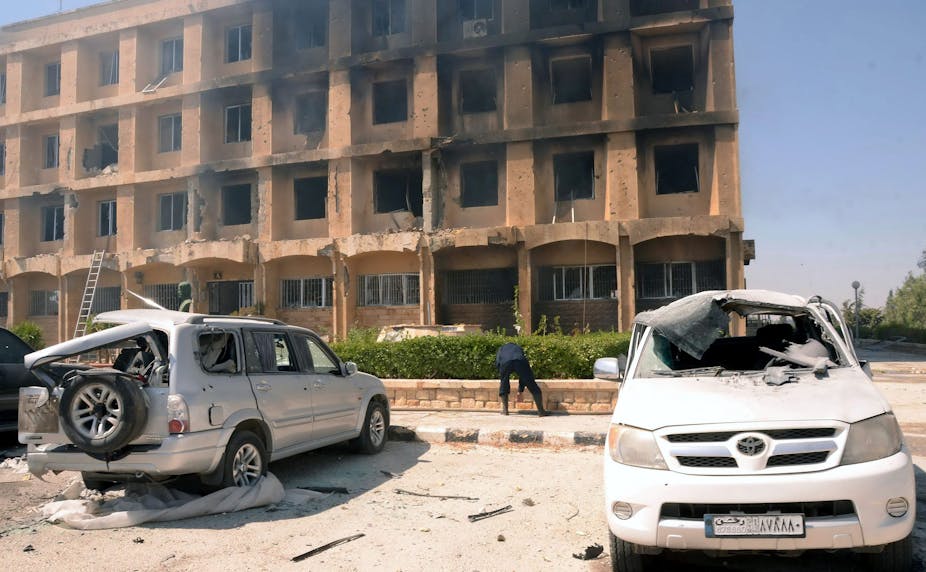It is a paradox of our digital age that, despite an enormous supply of information, a powerful yet misleading consensus can still shape the course of international relations. Such was the case with the supposed threat from Saddam Hussein’s “weapons of mass destruction”, and such is the case with the foreign-backed “revolution” in Syria.
The “consensus” from March 2011 was that President Bashar al-Assad was a “brutal dictator”; the Syrian people had risen up against his regime as part of the Arab Spring’s democratic awakening; Assad’s minority Alawi group was repressing the majority Sunni group; and a rebel force had been formed from army defectors and outside forces were only helping them defend a civilian population.
In my opinion, virtually every element of this picture was false. While a political opposition had pressed for President Assad to deliver on his promise of political reform and to clean up corruption, the armed attacks of the Free Syrian Army (FSA) derailed this process.
The big powers scrambled to form an alliance with the most fanatical of Islamists, but by the end of 2011 an independent poll showed that most Syrians wanted Assad to stay.
Australian academic Jeremy Salt wrote from Turkey that “the killing of soldiers, police and civilians, often in the most brutal circumstances, has been going on virtually since the beginning”. The Saudi Arabian elite had openly admitted arming the Salafis, a sect within Sunni Islam which rejects secular states in the predominantly Muslim region.
The mass media “consensus” did not spring out of thin air. The US, now joined by former colonial powers France and Britain, foreshadowed “regime change” for Syria ten years ago, in George W. Bush’s plan for a “New Middle East”. This plan involved the toppling of seven governments: Iraq, Syria, Lebanon, Libya, Somalia, Sudan, and Iran.
But it has taken well over a year for the mass media consensus on Syria to begin to unravel. After online film of gruesome FSA atrocities, dissenting reports began to recognise: that al-Qaeda and foreign fundamentalists were deeply embedded in the FSA.
Similarly, Christian militia had taken up arms to protect themselves from FSA ethnic cleansing, and that many atrocities against civilians, attributed to the government, were the work of the rebels.
In this context a group of Syrian-Australians, Australian supporters formed groups such as “Hands Off Syria”, committed to producing better information on the conflict and defending some rather traditional principles: that the Syrian Government is for the Syrian people to decide. Foreign intervention, by arming the FSA, is sure to worsen the crisis.
The dreadful Houla massacre of civilians in May this year formed the basis for a rapid expulsion of Syrian diplomats from several countries, including Australia. I am one of several who have argued, based on the available evidence, and contrary to statements from the UN, that the massacre was more likely a “false flag” atrocity committed by FSA fundamentalists than an act of the pro government forces.

The victims were pro-government families and others who would not back the FSA. They did this just before a UN Security Council meeting, in an attempt to bring in NATO air support, as had occurred in Libya.
Philip Giraldi says the CIA “refuses to sign off” on claims at the UN that the Syrian Government has massacred civilians, nor that there have been “mass defections from the Syrian Army and pitched battles between deserters and loyal soldiers”. Independent evidence (from journalists including Robert Fisk and from Medicins Sans Frontiers) tends to show an FSA composed of Islamist and often foreign fighters.
The former head of the UN’s mission in Syria, Norwegian General Robert Mood, now says that countries arming the rebels (France, Britain, Saudi Arabia, Qatar, Turkey and the US) are “feeding the violence with money or weapons … [and that this] may actually prolong the terrible suffering for the Syrian people”.
Further false flag atrocities like that at Houla will also be encouraged so long as the FSA believes there is hope of these inciting greater foreign intervention in their favour. President Obama, immersed in an election campaign, does not currently seem keen on raising such hopes; but nor does any Washington administration want an independent Syrian government not integrated into the New Middle East plan.
The current crisis has much less to do with President Assad as a combined big power and Islamist assault on a secular and independent Syrian nation.
Yet it would be a great tragedy if, for all its problems, the most tolerant and multicultural nation in the region were reduced to the sectarian chaos of neighbouring Iraq. Australians with a conscience should not help this happen.

